Having a genetic disorder that requires constant treatment in the hospital sucks, but having a genetic disorder that requires constant treatment in the hospital during a global pandemic sucks balls.
And playing into Murphy’s Law, as the pandemic got worse, so did my (unrelated) health problem. I have been to the ER, I have been to the clinic and I have been admitted as in inpatient all while the virus ravaged the world.
But before I go into that, let me give you an idea of what life is like in China now. We were put on lockdown in January, but we have been out of it for months. Basically our lockdown ended right about the time America and the west started seeing the virus. These days China has only a few new cases a day, usually less than 10 carried in from people returning from other countries, and most cities haven’t had a new case in months.
I know that’s hard to believe in the world’s most populated country not known for its hygiene could contain the virus so quickly. I also know many people don’t believe the numbers as the government is also not known for transparency and they royally screwed up the early day of this virus.

But I feel safe here. Partially because I’ve spent so much time at the hospital and see how the medical institutes work, but also because of what we have to do everyday. Masks are still mandatory inside building like supermarket five months later, and we have been warned they will be required for a year or longer. (And yes, everyone wears them when required!) Only after two kids died while running did the government relax restrictions of wearing a mask during exercise (and in the past few days they said if you are socially distancing you don’t need one outside) but to go shopping or to get on a bus or subway you are still required to wear them, and wear them correctly. A mask is uncomfortable and can feel like wet underwear on your face on a hot sweaty day (I live in the humid south after all- I carry an extra mask in my bag in case I sweat through mine) but when someone sneezes in a small enclosed space like a subway, you are soooo happy everyone has a mask on.
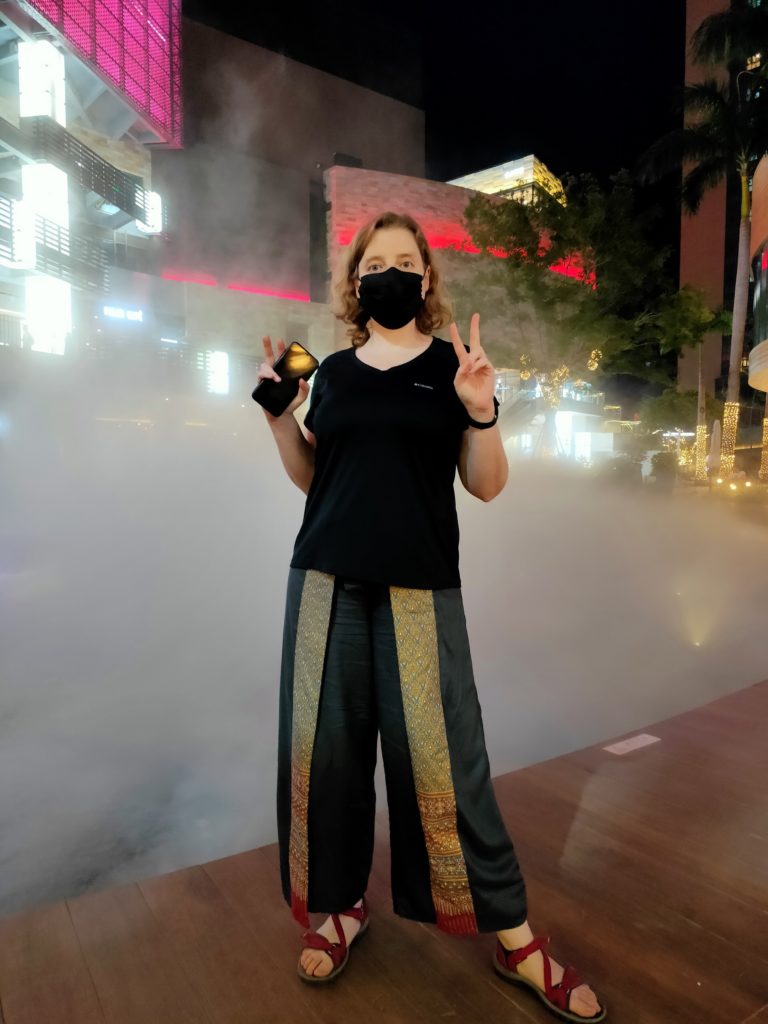
Then there are the temperature checks. Pretty much every time you want to enter a building or eat in a restaurant you have to get your temperature checked. The closest supermarket is less than a mile from my house and a quick trip there will have my temp checked 5 times. And if you have a fever they don’t just let you go. Most places have a quarantine area where you must go and sit while they call the police or the ambulance to pick you up and bring you to the hospital to get tested.
It doesn’t mater if you are carrying a big bag of groceries, it doesn’t matter if you have a reason you have a fever, it doesn’t matter if a 10-year-old kid is waiting for you at home alone, you will be going to the hospital first and you won’t be released until they are 100% sure you do not have the virus. (And if you DO have the virus you won’t be allowed to leave the hospital for any reason. You better call a friend to pick up that kid waiting home alone, and throw away those thawed groceries you no longer can eat.)
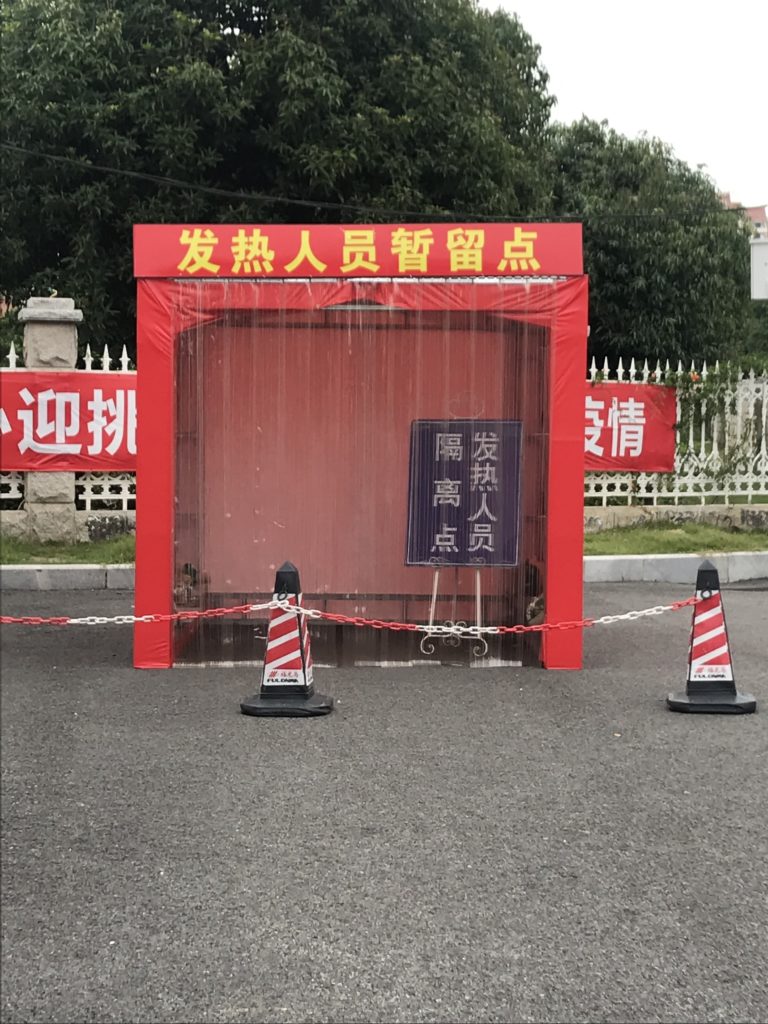
I mean, in Xiamen we had one asymptomatic woman who was caught during random testing and, within just a few hours, they managed to quarantine (under surveillance, not self quarantine) more than 50 people she had been in contact with, closed down a workers villages where she lived, blocked off several roads so people couldn’t even drive in that area and widely circulated an article about the woman and where she had been. That was for one ASYMPTOMATIC person. Every single case, or suspected case, is taken extremely seriously here.
So, back to the hospital.
The first time I needed to go to the ER was a mere four days after they locked down the city of Wuhan. Maybe you don’t remember the early days of the virus back in January, but I do. It was scary AF. We didn’t know how it spread, didn’t know the symptoms, didn’t know the death rate, didn’t know nothin’. It didn’t even have a name, much less testing at that point. Many people were calling it “the zombie flu” and claiming healthy people were just keeling over in the streets from it and bodies were being stacked all over the country. We knew the government had tried to cover it up so al information at that time was suspect.
The last place I wanted to go was the hospital. I mean, I really, really didn’t want to go. But I was very weak and sick and needed treatment. So I wore my precious N95 mask, wore all washable clothing (including a washable bag), went so far as to even cut my nails super short, crossed my fingers and went to the hospital. (The second I got home I knew I would be throwing away the mask, washing all the clothes immediately with bleach and taking a shower.)
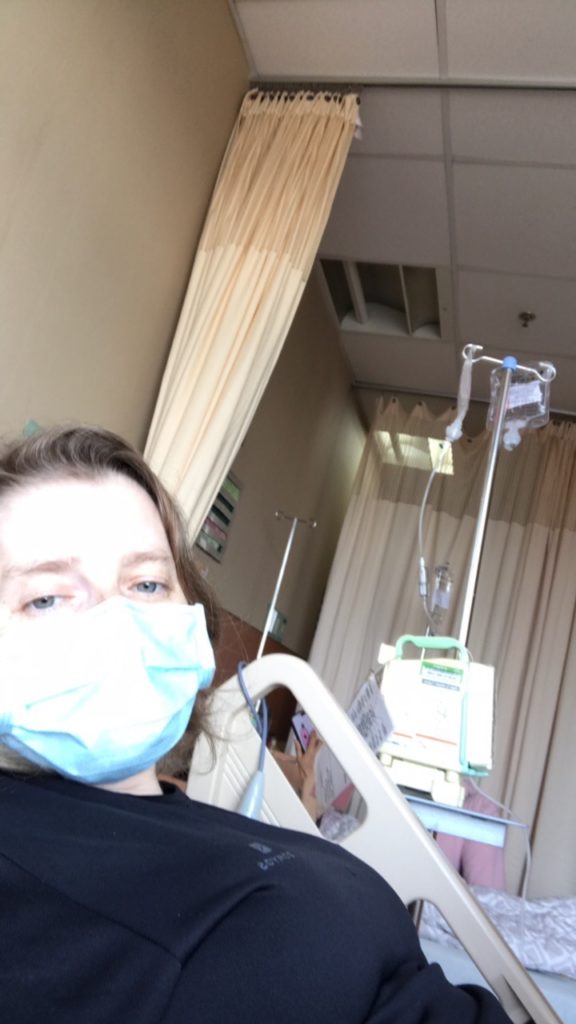
Since I had been to the ER so many times before, I knew the procedure. But things had changed the day Wuhan was locked up and the hospital had new ways of doing things. First, I was greeted at the door by a worker in PPE who took my temp, squirted a liberal dose of disinfectant on my hands, checked if I was coughing or sneezing and asked me if I had been to Wuhan or talked to anyone from Wuhan recently. If I had said yes, (or had a fever) I would not be allowed into the hospital. Now, five months later, that is still true. Let me say that again.
No sick person with suspected Covid is allowed in the hospital
Instead, the hospital has an isolated fever clinic with an exterior entrance they have to go to make sure all potentially sick patients do not contaminate the hospital or ER. You might think that’s a little crazy, you can have a fever for a million reasons, but right now hospitals don’t care.
Everyone in the fever clinic needs to be evaluated by a doctor (in PPE) first to find the cause of the fever, or to rule out Covid with some tests, before being allowed to enter the actual hospital. (Obviously this rule is waved for people with real emergencies that need attention right away.)
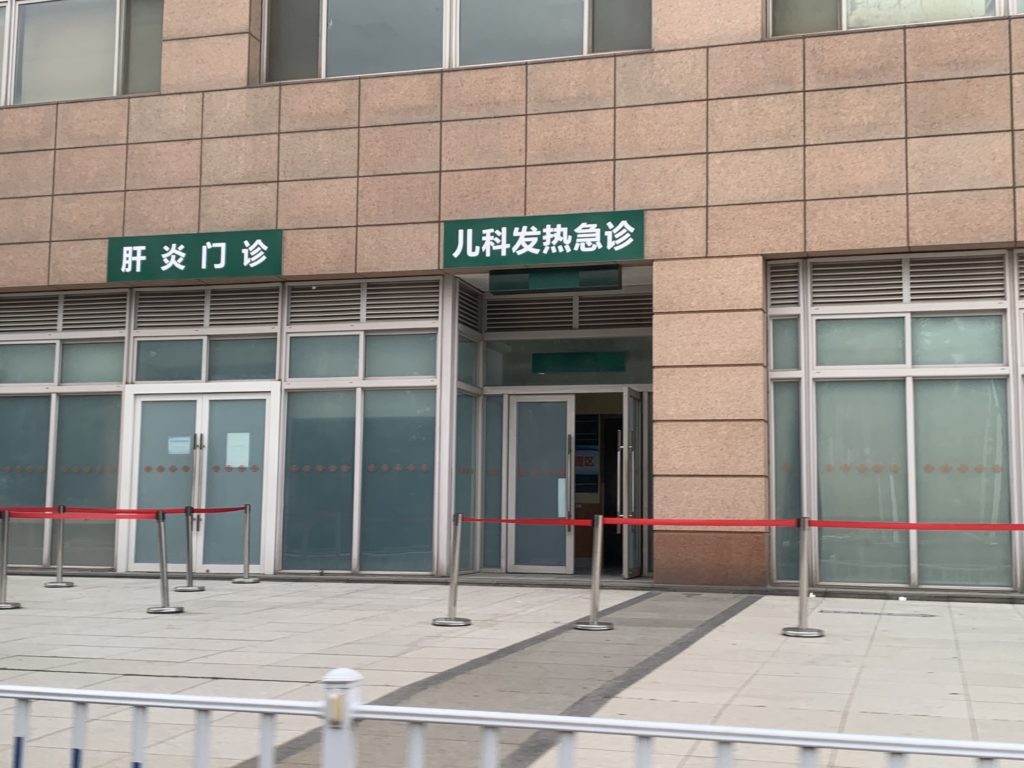
Luckily right from the start it seemed that Xiamen was not going to be a hard hit city. While we have a population equal to the second largest city in America (about 4 million, equal to LA) we only had 35 official cases at the peak of the virus. So hospitals were never overwhelmed. In fact, cities designated “Covid Hospitals” where all cases, or suspected cases, would go. In Xiamen there were few enough cases where they only needed one hospital to treat everyone, so I avoided that hospital. Of course sick people can go to any hospital but you would go directly to the fever clinic and then if it seemed likely you had it, you would be brought specifically to the one hospital treating Covid patients. So no one with Covid actually stayed at the hospital I go to.
Now the hospital has infrared temp checkers and QR codes that the hospital workers check before we can enter. It’s an app created by the city that uses the data from our phone to see if we are “safe” or not (based on where you have been in the past two weeks.) A green code means you can enter, a orange or red means you have to go through the fever clinic before seeing a doctor.
This means there is a bit of a mess at the door to the ER and main entrance of the hospital as everyone needs to fiddle with their phones and sign up for the code if they don’t have it already, but it is a bit of a relief to know they are taking such precautions.

But that’s not all! To guarantee that no single patient in the hospital has Covid you are now required to be tested for both active Covid (with a throat swab) and Covid antibodies (with a blood test) before you are allowed to check into your room. (The tests are free though.)
Yep, every single patient needs to be tested…including me. It’s a huge pain in the ass, takes about an hour to get it all done, then you have to wait 6-8 hours to get the results which you must have before they allow you to get a bed. That means a lot of sitting in the waiting room, or, in my case, delayed treatment. (I went home and went back the next day when my results were in.)
Inside the hospital has also changed. Unfortunately I have been an inpatient a lot pre-Covid, so the changes were obvious. First, they sealed off some of the wards. It means that hospital occupancy is lessened but if the virus gets in, not as many people could get sick as a full hospital. Doors to the wards, usually open, are closed and you needed to ring a bell to enter to avoid too many people coming and going freely.
Masks are required in the rooms as well (yep, people sleep with them on), and fevers are still taken quite seriously. The nurses go around and check not just patients temperatures but all the guests on a regular schedule.
The thing that scares me the most is the temp checks. It’s because for my treatment, I also need to get my temperature checked so I know, from the past year, I occasionally get random tiny temperatures. Previously it wasn’t a problem, the nurses would just wait a few minutes check again and it would always be gone.

But then, one day recently I had a fever. I was already in the ER, I had been sitting in a bed for a few hours waiting for my treatment, but this time they didn’t just let it go or even wait a few moments. They immediately made a call to some special department and a doctor I had never seen before came over and started peppering me with questions. Since there is no 3 minute Covid test (yet) they needed to do everything to figure out if I was sick…fast. The doctor also told me, a few times, to not remove my mask not to even take it off to drink water.
So I had to get my urine tested and then I had to get a CT scan of my lungs. If any of the results were even slightly off I would have been packed up and isolated and not be allowed to leave until I had a nucleic test. Luckily for me, both tests results were “very, very normal” (Doctor’s words) and by the time it was all over I no longer had a fever and could get my treatment. Crisis averted. But it’s made me really nervous about every single temperature check since then.
So that’s my experience these days. I’ve had people ask me if it is true that everyone is walking around sick in China, or there are stacks of dead at the hospitals the government is covering up and I can say no, that actually China is a lot safer than many people think right now because testing is high.
Even if you have just a little cold, you will likely be sent to the hospital for testing by someone from your own building. But you don’t even need to be sick or have symptoms to be tested. In Wuhan they decided to test all 11 million residents in a 2 week period. Even though testing can’t predict the future (a healthy person today can be sick tomorrow) it is giving more information about how many people are asymptomatic in a big population, and catching anyone with an early stage of the virus. Since Wuahn is the epicenter of the virus, it is a good city to get info from to try to understand the spread.
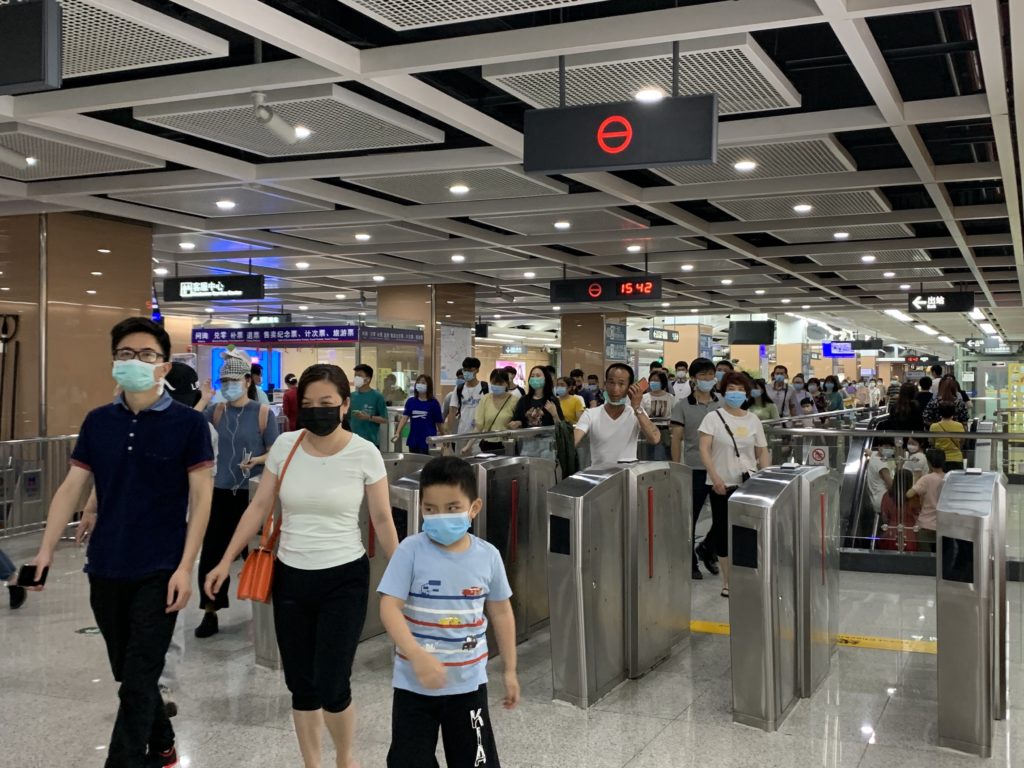
Of course I can only say what I have seen with my own eyes in my own city and things could be different elsewhere, but I will say that I feel much safer living here than I would in America. Honestly, many foreigners here (in many cities) feel that way, but with all the hatred towards China, we can’t really admit it out loud or we get accused of lying, of being paid by the Chinese government, being scared of the gov’t so we only say nice things or just outright being communists. “How dare you say you feel safer in Commie China than the ‘Murica, the greatest country on earth!” So we just keep quiet and talk about it among ourselves.
I even debated writing this article for awhile, because every time I write something positive about my experience in China on Facebook, I get attacked. Even my usually open minded and cool friends seem whipped in a frenzied hatred at China right now and consider it their patriot duty to contradict me because they read an article in The Times so clearly they know more than me and my experiences are wrong. * Eye roll*
But there aren’t a ton of stories of Americans living in China, with health problems, who have to go to the hospital regularly, and while I wish wasn’t, I am something of an expert on this topic. So I might as well write about it, right?
If you are interested seeing other westerners living in China right now, talking about what other cities are like you can check out a British woman named Nico in Beijing, or a Brit named Nick in Xian, or Brian an Argentinian who had to go through government supervised quarantine in Beijing. They are in different cities, but they are having very similar experiences to my life. (Even the part where the get accused of being fake or paid by the Chinese government because no one can believe we are telling the truth.)
It’s a weird time in the world, and it really sucks to be sick now and require regular medical attention. But thanks to the precautions I, and everyone else here are required to follow, I do feel like I’ll make it through the other side and hopefully in another year or so, not only will the whole world heal, but I will as well.
Stay indoors, wear a mask and take care of yourself.




Thank you, Becky, for sharing your experience: Wishing you health. Aloha, Renée